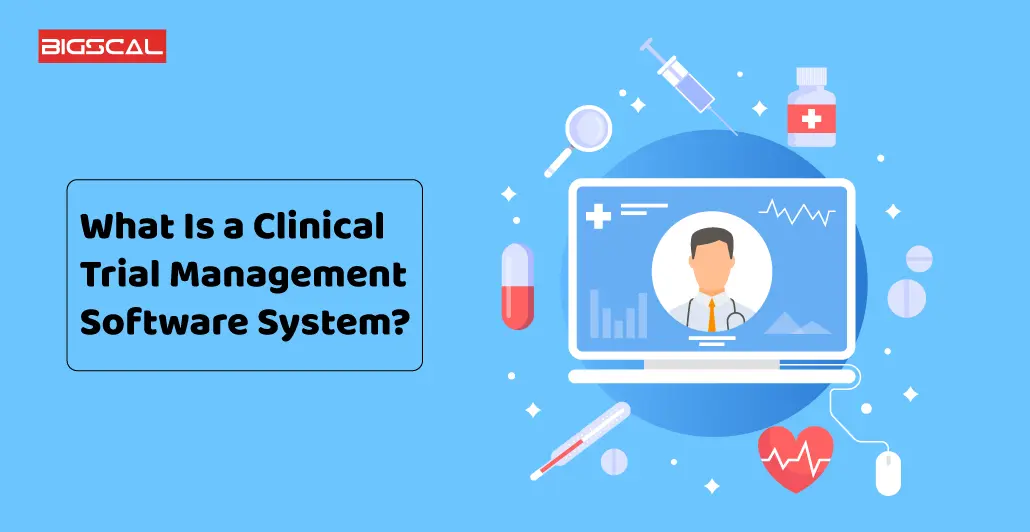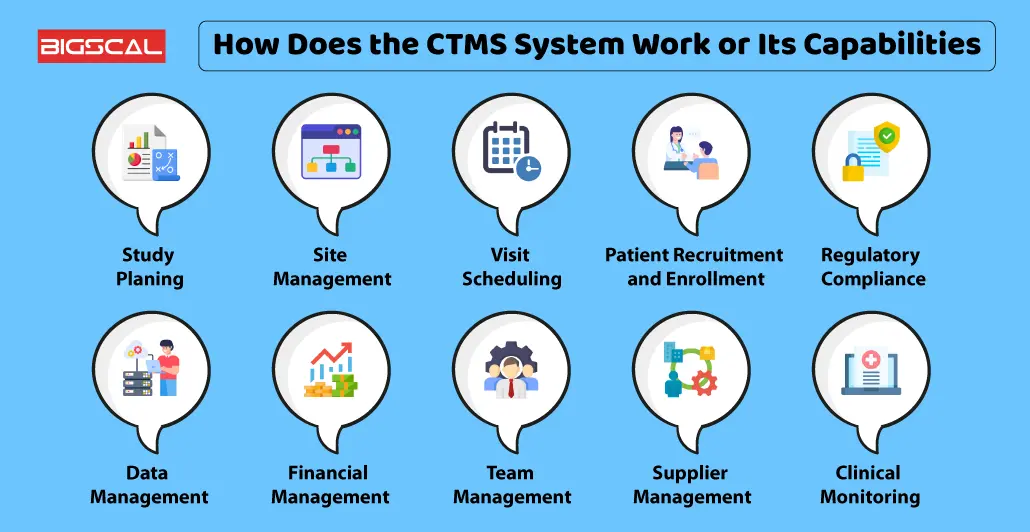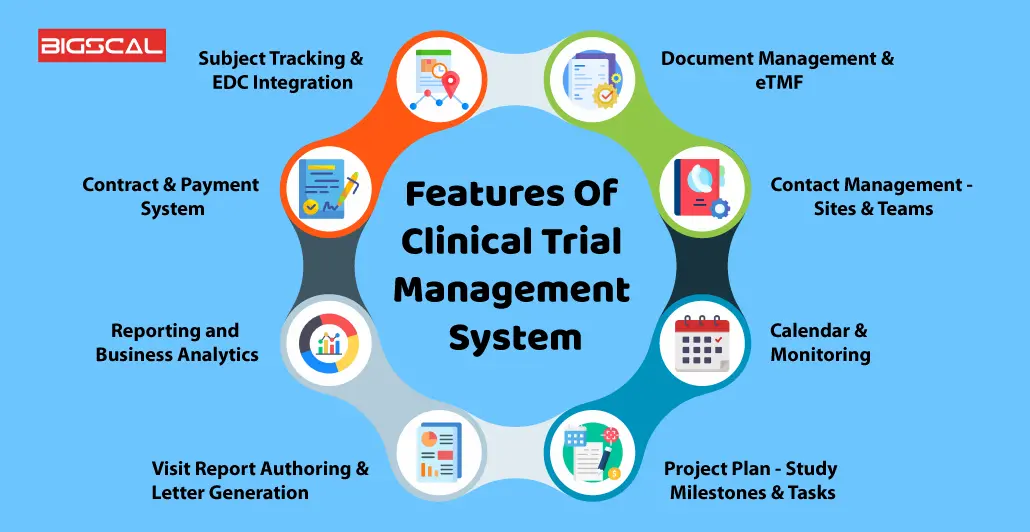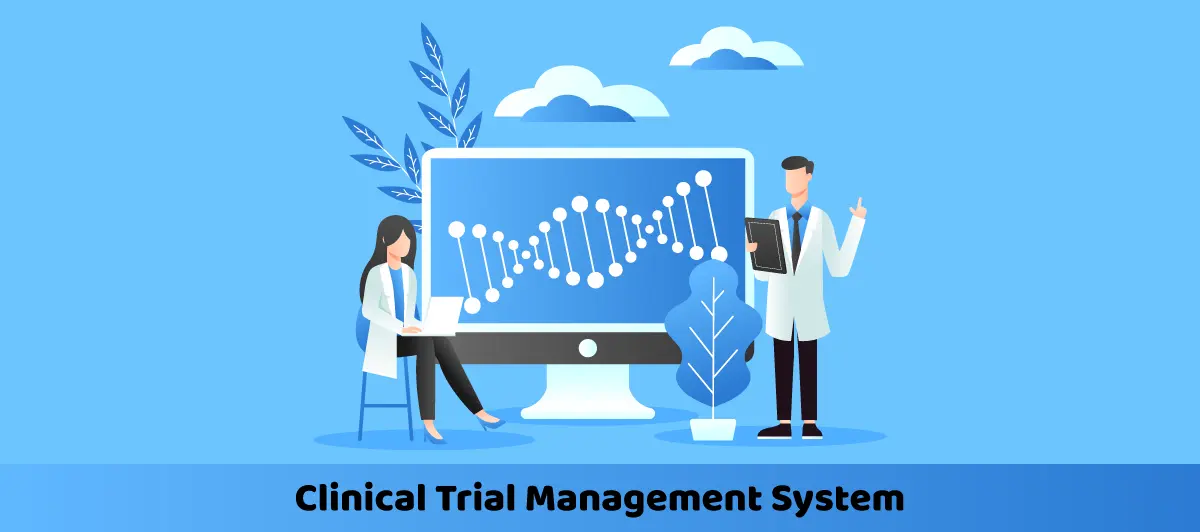Clinical Trial Management System: All You Need To Know
Quick Summary: Clinical Trial Management System, you must have heard about this! CTMS is essential for efficient and organized clinical trials, streamlining processes for critical components like participant recruitment, data management, and reporting. This software ensures data accuracy, regulatory compliance, and collaboration among research teams, ultimately expediting the development of new treatments and therapies. But you haven’t found all the answers to your queries at one place. That’s why you need to read this article, we will discuss everything about the CTMS.
Introduction
A clinical trial management system is necessary for all doctors. In this growing era of innovation, implementing CTMS is the ultimate step towards a clinic’s success. It emerges as the key to progress in patient management.
The number shows its importance: 80% of clinic trials experience delays attributed to manual data management and other systems inefficiencies. Here, CTMS works that reduces trial durations by 33% and cuts operational costs by 25%. Consider this a future where research teams collaborate seamlessly, patient recruitment increases by 40%, and data errors plummet by 90%.
This article is dedicated solely to Clinical Trial Management Software Systems; you will get all your knowledge by reading this.
Keep reading!
What Is a Clinical Trial Management System?

Before understanding how CTMS works, let’s understand What Is a Clinical Trial Management System?
So, CTMS is a type of clinic management system. It is a digital tool researchers and pharmaceutical companies use to plan, track, and manage clinic trials efficiently. Additionally, it simplifies complex processes by organizing participant enrollment, scheduling, budgeting, and regulatory compliance data. CTMS streamlines communication among team members, helping to ensure smooth collaboration between researchers, clinicians, and administrators.
This software enhances accuracy in clinical studies by tracking trial progress, minimizing errors, and improving overall efficiency of study startup. It also aids in compliance with regulatory standards by maintaining detailed records. A good part is that it can even integrate in a Vet clinic management system.
Top CTMS Companies
Here’s the list of top clinical trial software Companies:
- MasterControl Clinical Excellence
- CloudLIMS
- Clinion
- OnCore
- Medidata Solutions
- ClinPlus
- Advarra eReg
- Quanta View
- Fusion eClinical Suite
- Medable in Palo Alto offers their Digital Trial Platform
How Does the System Work or What’s Its Capabilities?
Read below points to understand what are the capabilities of a CTMS and this is how it works:

Study Planning
CTMS simplifies study planning by organizing and centralizing important information. Such information includes patient demographics, inclusion criteria, and visit schedules. In addition, it optimizes resource allocation by predicting personnel, equipment, and sites. Additionally, it aids in budgeting by providing cost estimates for various trial components.
Site Management
It also manages sites by coordinating activities across multiple research sites. It facilitates seamless communication between investigators, sponsors, and site staff. CTMS tracks site performance metrics, monitoring reports, ensuring timelines are met, and issues are promptly addressed. Additionally, it systemizes document management including regulatory submissions and approvals.
Visit Scheduling
Clinical trial management is a software system that simplifies the process of scheduling site visits in clinical trials. It allows researchers to efficiently plan and organize participant visits, ensuring that each visit aligns with the trial protocol. This includes coordinating dates, times, and locations helping to manage the logistics simply.
Patient Recruitment and Enrollment
The major capability of CTMS is patient recruitment and enrollment. It assists researchers in identifying and recruiting suitable participants for clinic trials by maintaining a comprehensive database. This database helps track potential candidates, assess their eligibility, and manage the enrollment process. By automating these tasks, CTMS accelerates the recruitment phase, enhances participant engagement, and contributes to the timely completion of clinic trials.
Regulatory Compliance
It ensures the functionality as per the regulatory standards. It tracks and manages all regulatory requirements, helping organizations adhere to industry standards and guidelines. This includes monitoring protocol, patient safety, billing compliance and documentation completeness. By automating compliance tasks, CTMS reduces the risk of errors, ensuring that trials meet regulatory standards.
Data Management
CTMS also functions as efficient data management throughout the trial lifecycle. It centralizes data from various sources, offering a comprehensive view for better decision-making. In addition, this system tracks patient enrollment, visit schedules, and data collection, promoting data accuracy and integrity. Further, improved data management enhances stakeholder collaboration, accelerates study timelines, and facilitates real-time monitoring.
Financial Management
A CTMS simplifies financial aspects of clinical trials. It enables efficient budget planning, tracking, and reporting. Through this system, organizations can allocate resources, monitor expenses, and ensure adherence to budgetary constraints. Financial management within CTMS facilitates real-time visibility into trial costs, aiding in identifying potential oversights and optimizing financial strategies.
Team Management
CTMS is instrumental in collaboration and coordination of diverse teams involved in clinical trials. In addition, it provides a centralized platform for team members to communicate, share information, and manage tasks seamlessly. Team management capabilities include assigning roles, tracking individual team progress, and establishing collaboration. Furthermore, this ensures that everyone involved, from investigators to coordinators, works cohesively towards common objectives.
Supplier Management
CTMS also works to facilitate efficient supplier management in clinical trial by organizing and simplifying interactions with various vendors. It centralizes relevant sponsor data and, related to suppliers, provides easy access to information on services, contracts, and performance. Additionally, this helps evaluate and select suppliers, manage contracts, and monitor their contributions to the trial. The system enables seamless communication between sponsors and suppliers, fostering collaboration and ensuring that the supply chain operates smoothly.
Clinical Monitoring
Clinical trial management systems also work as clinical monitoring. The Clinical Monitoring is a critical aspect of clinical trials, and CTMS is essential. It helps monitor and track the progress of the problem at different sites. CTMS centralizes patient data, visit schedules, and regulatory compliance information, providing real-time insights. This allows for efficient monitoring of patient safety and data quality. Additionally, CTMS aids in allocating monitoring resources, optimizing the on site monitoring process and ensuring protocols.
Investigator Payments
A Clinical Trial Management System (CTMS) is important in managing investigator payments within clinical trials. It automates and streamlines the financial aspects of managing clinical trials and research itself, ensuring timely and accurate compensation for investigators and research sites. To calculate costs, the CTMS tracks milestones and activities, such as patient enrollment and protocol compliance.
Issue Management
The Issue Management capability of a CTMS is to enhance the efficiency of clinical trials by addressing and resolving challenges promptly. It provides a centralized platform for identifying, documenting, and tracking issues that may arise during the trial. This includes discrepancies in data, regulatory compliance concerns, or logistical problems. The CTMS facilitates stakeholder collaboration, allowing real-time communication and systematic resolution of issues.
Communication and Collaboration
Clinical Trial Management system (CTMS) facilitate seamless communication and collaboration among stakeholders involved in clinic trials. These systems function as centralized hubs for research operations, allowing researchers, sponsors, and other team members to share critical information in real-time.
Through secure communication channels, updates on trial progress, participant statuses, and protocol adherence can be exchanged efficiently. Additionally, CTMS enables collaborative decision-making by providing a platform and secure location for team members to discuss and address issues promptly.
Risk Management
CTMS plays a pivotal role in effective risk management within clinical trials. It allows teams to identify, assess, and mitigate potential risks associated with the trial processes. By integrated tracking and reporting features, CTMS helps monitor various risk factors at clinical research sites, such as protocol deviations, adverse events, and resource constraints.
The system enables proactive decision-making to minimize potential challenges by providing a comprehensive overview of these risks. CTMS also aids in compliance with regulatory requirements, ensuring that the conduct studies the trial adheres to established protocols and guidelines.
Essential Document Tracking
The document tracking within a CTMS involves a systematic process of uploading, categorizing, and monitoring essential trial documents. It provides professional services and a centralized repository accessible to authorized personnel, allowing them to track the status and completeness of documents easily.
The CTMS’s Essential Document Tracking capability offers real-time visibility into document status, reducing the risk of missing or incomplete electronic records. It automates document version control, ensuring the most current and approved versions are readily available.
Features Of Clinical Trial Management System

Document Management & eTMF
A Clinical Trial Management System (CTMS) with Document Management and an Electronic Trial Master File (eTMF) simplifies handling trial documents. It organizes essential files like protocols and regulatory submissions, ensuring easy access and version control. The eTMF streamlines document tracking trend analysis, making audits more efficient, and enhances collaboration among trial stakeholders.
Contact Management – Sites & Teams
Effective management of trial sites and teams is important. A CTMS with Contact Management allows easy tracking of site details and team members. This feature helps streamline communication, monitor site progress, and ensure all involved parties stay well-connected, facilitating smoother collaboration throughout the clinical trial process.
Calendar & Monitoring
A Clinical Trial Management System’s calendar feature helps organize study events. It functions like a digital planner, ensuring everyone involved knows when tasks are due, appointments are scheduled, and milestones should be achieved. Monitoring capabilities track progress, flagging any delays or issues promptly. This ensures smooth coordination among study team and members, reduces the risk of oversights, and enhances overall study efficiency.
Project Plan – Study Milestones & Tasks
The project plan feature maps out the entire clinical trial journey. It outlines study milestones, such as participant recruitment or data collection phases, and breaks them into manageable tasks. This aids the contract research organizations in strategic planning, resource allocation, and timely execution of multiple studies, fostering a structured and well-coordinated approach to conducting clinical trials.
Subject Tracking & EDC Integration
A Clinical Trial Management System (CTMS) with Subject Tracking & EDC Integration helps efficiently monitor participants and seamlessly integrates with Electronic Data Capture (EDC) systems. It enables easy tracking of subjects’ progress, ensuring timely data collection, and enhances overall clinical trial data management. This integration streamlines the data entry, minimizing errors and improving data accuracy.
Contract & Payment System
Utilizing a Contract and payment System within a CTMS simplifies the financial aspects of clinical trials. It manages contracts with various stakeholders and facilitates smooth payment processes. This feature ensures transparency in financial transactions, aids in budgeting, and assists in adhering to contractual agreements, promoting a more organized and accountable approach to trial finances.
In the case of large-scale clinical trials, CTMS’ in-built contract management functionality may not be sufficient for handling high volumes of clinical trial contracts. You can integrate your clinical trial monitoring system with one of the contract lifecycle management tools. This helps seamlessly manage payment obligations for large volumes of clinical trial contracts.
Reporting and Business Analytics
Clinical Trial Management Systems (CTMS) include robust reporting and analytics features. This means they can compile and analyze data from clinical trials, providing valuable insights for researchers and stakeholders. These tools help track and assess the problems’ progress, identify trends, and make informed decisions. By generating comprehensive reports, CTMS ensures that stakeholders have a clear understanding of the trial’s status and can strategize based on real-time data.
Visit Report Authoring & Letter Generation
CTMS simplifies the process of generating reports, documenting and authoring visit reports. Researchers can efficiently create detailed reports about each participant’s visit, recording observations and outcomes. Additionally, the system facilitates the generation of letters, streamlining communication between the research team and participants.
This ensures accurate and timely communication, contributing to the overall efficiency of the clinical trial process. By automating these tasks, CTMS enhances the organization budget management and documentation of important trial-related patient information throughout.
Develop CTMS System With Bigscal
If you need a clinical trial management system. You can collaborate with us to develop an innovative clinical trial management system CTMS. Leverage our expertise in technology solutions, we focus on creating a user-friendly CTMS with full capabilities. We will integrate features like patient recruitment tracking, scheduling, etc. in the clinical trial management system.
We commit to innovation and ensure the integration of advanced analytics for real-time insights, facilitating informed decision-making. With a focus on user experience, the system will offer intuitive interfaces for investigators, sponsors, and monitors.
Conclusion
So, this blog post was all about the CTMS; we hope you now understand how the clinical trial management system works. From efficient data management to seamless stakeholder collaboration, CTMS enhances accuracy and accelerates research timelines. Its user-friendly interface and features make it a cornerstone in modern healthcare research. By centralizing information and automating workflows, CTMS ensures compliance and improves the overall quality of clinical trials.
FAQ
What is meant by clinical trial management?
Clinical trial management involves planning, organizing, and overseeing the processes of conducting medical research studies. It includes protocol development, participant recruitment, data collection, and regulatory compliance. Efficient management ensures the successful implementation of clinical trials, contributing to advancing medical knowledge and treatments.
What does a clinical trials manager do?
A clinical trials manager oversees the planning and execution of clinical trials. Responsibilities include:
- Developing protocols.
- Coordinating with research teams.
- Ensuring regulatory compliance.
- Managing budgets and timelines.
- Handling data collection.
These responsibilities ensure clinical research studies’ smooth and ethical conduct.
What are the objectives of clinical trial management?
The objectives for different aspects of clinical trial management include:
- Designing robust study protocols.
- Recruiting suitable participants.
- Ensuring regulatory compliance.
- Managing resources efficiently.
- Collecting high-quality data.
- Maintaining participant safety.
- Adhering to timelines and budgets.
- Contributing valid findings to advance medical knowledge and improve patient care.
What is clinical trial project management?
Clinical trial project management involves planning, organizing, and overseeing the various elements of a clinical trial. It includes defining project goals, developing timelines, allocating resources, managing risks, and ensuring adherence to protocols and regulations. Effective project management is crucial for the successful and ethical completion of clinical trials.
What is the difference between CTMS and EDC?
Clinical Trial Management System (CTMS) focuses on overall trial management, including planning, tracking, and reporting. Electronic Data Capture (EDC) collects and manages clinical trial data electronically. While CTMS handles the broader trial management aspects, EDC concentrates more on efficient data capture and analysis.





